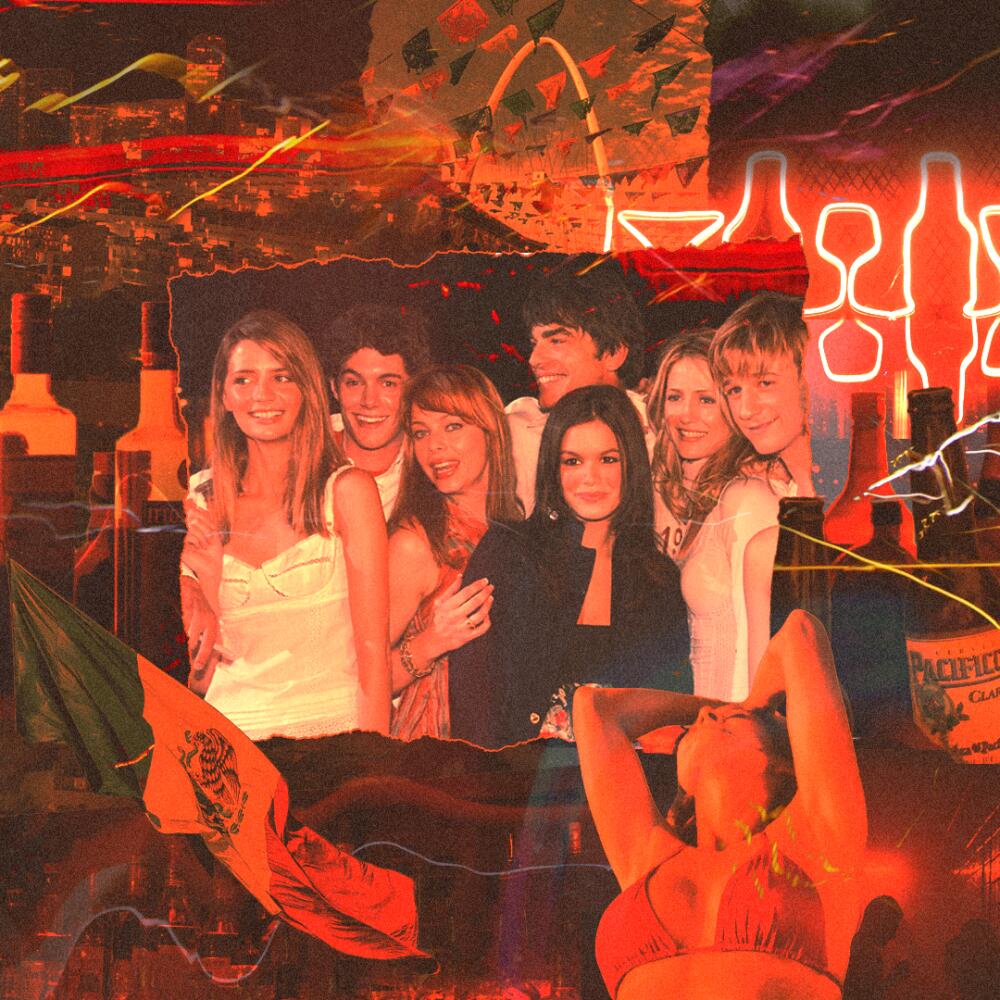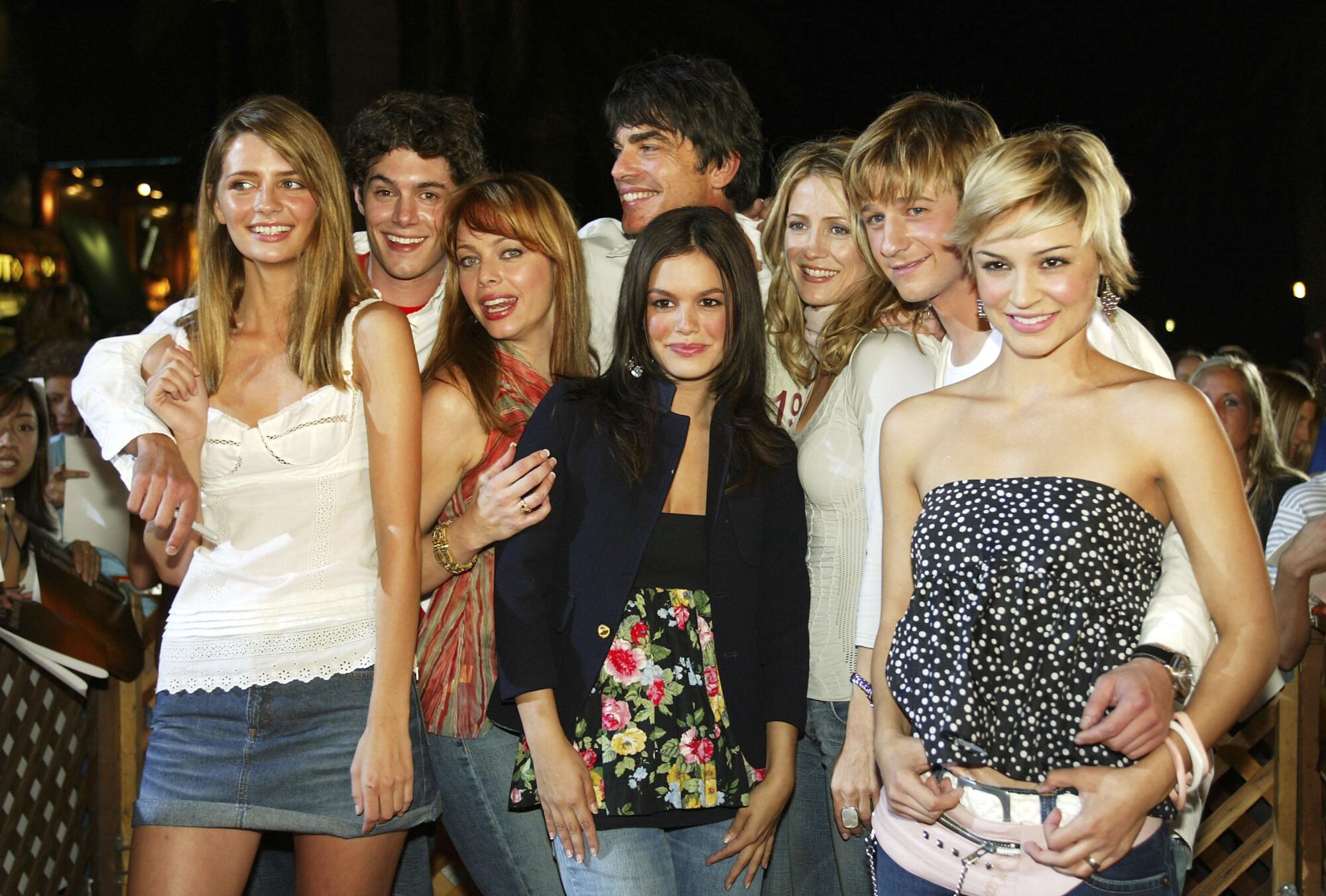
Twenty years ago, “The O.C.,” created by Josh Schwartz, premiered on Fox. It was a massive hit, becoming the highest rated new drama of the 2003-04 season and mandatory appointment viewing for us members of the Urban Outfitters generation.
Millions tuned in every week to watch misunderstood bad boy Ryan Atwood (Ben McKenzie) leave his home in Chino to be adopted by wealthy Orange County do-gooders Sandy and Kirsten Cohen (Peter Gallagher and Kelly Rowan). Along with his quick-witted, emo sidekick Seth Cohen (Adam Brody), Ryan weaves through the Newport Beach social scene that actively despises Chino residents in undertanks, all while falling for Marissa (Mischa Barton), the tortured girl next door.
Latino-run shows sometimes perpetuate stereotypes we would criticize in other shows. And some non-Latino shows do a better job of telling our stories than Latino-run shows
Not too far from Ryan, I, too, was surrounded by Orange County teens, only I was at UC San Diego surviving my first steps into adulthood. Orange County kids swarmed the concrete compound of our university with their Volcom T-shirts, pink Motorola Razrs and endless dunking on the 909.
As a native San Diegan and Tijuanense, I routinely defended my hometowns as they insisted Orange County had better tap water, burritos, beaches, etc. Their assertion of their dominance only worsened when the show took over the culture, leading to a constant, months-long barrage of “Welcome to the O.C., bitch!”

It was an easy show to get sucked into — a hot mom hooks up with their daughter’s boyfriend, financial fraud ruins multiple social events, and multiple love triangles have you rooting for Team Ryan or Team Anna. And it was all packaged in a way that reflected the generation’s style and tastes, down to the mid-aughts indie soundtrack and ironic tees.
Each episode brought a new drama that, without fail, led to Ryan punching the puka shell necklace off a dude’s neck. But for me, one of the gang’s most important adventures was an ill-fated trip to a little town they called Tee-ah-WAH-nuh.
The episode, titled “The Escape,” originally aired on Sept. 16, 2003. Written by Schwartz, the episode follows Ryan, Seth and mega brat Summer (Rachel Bilson) as they make their way down to Tijuana for a weekend of partying before the school year starts, with a reluctant Marissa joining the trip at the last minute.
“It is tradition, and it is a rite of passage,” Seth persuades Ryan. “You know what else? What happens in Mexico stays in Mexico.” What could possibly be happening in Mexico? “I don’t know, because it stays there,” Seth quips.
‘What motivates us every day to write songs and music is the great pride of having Mexican blood in our veins.’
This is what happens with these white kids in TJ: Marissa finds out her parents are getting a divorce. She spirals, but is convinced by Summer that the best way to ease her sorrows is raging at a club called Boom-Boom, where there’s bikini-clad go-go dancers, tequila shots administered via squirt gun, and a wet T-shirt contest destroying Forever 21 tops.
Just as the gang is letting loose, there’s Marissa’s boyfriend Luke making out with another girl to the Chemical Brothers’ “Out of Control” (banger). Ryan, naturally, punches the pukas off Luke. Marissa runs off, steals some painkillers Summer bought for her stepmom, and disappears into the sweltering streets. She ends up at an empty bar, wrestling with her pain and grabbing at the pill bottle the way people in infomercials do when they want to demonstrate how hard it is to open an envelope or strain pasta.
Marissa then does the unthinkable — she drinks a handful of pills, stumbles out of the bar and passes out in a dark alleyway. Thankfully, the gang finds her and Ryan dramatically carries her limp body in slow motion looking like a war-weary soldier carrying his dying lover.
I recall watching the episode and feeling embarrassed. I mean, Marissa remarks to Luke that “It’s kind of gross there,” and Summer expresses concern over donkey shows. Tijuana is dangerous and too enticing. Protect your daughters! I was raised deeply connected to Tijuana, spending weekends and school breaks running around chugging orange soda from sandwich bags (IYKYK).
The co-host of ‘Drag Race Mexico’ sat down with columnist Suzy Exposito to discuss her illustrious television career, her Chicana pride and the freedom of being nonbinary.
Once we moved to Tijuana when I was 12, it was only a couple of years before I was in the clubs myself, dancing and drinking cubetas of Pacifico. It’s what you do! And yeah, it can be dangerous.
“The O.C.” Tijuana episode employed the nasty, reductive framing I’ve heard about the city my whole life, and I was doubly bummed that this was the first time my hometown was depicted on a show my non-Mexican friends and I watched. When I got to college was when I began to experience shaming about my home from my peers. Their fears, their jokes, their incredulity that life can be good there spoke volumes. This episode did not help matters.
After the episode aired, it reignited my college peers’ curiosity to party in Tijuana, and I was excited to show them my Tijuana. I took some friends and acquaintances to my spot, Plaza del Zapato’s Britpop/new wave bar Porky’s, where there were fewer wet T-shirt contests and more smoking on the dance floor to the Smiths.
While most had the time of their life, a few wanted a full “The O.C.” experience, and behaved as such. Long story short, one of them got their nose broken by a local for trying to grind on his girlfriend. It was a classic case of messing around and finding out, and all I could think was “Welcome to the TJ, bitch.”
Tijuana has been infamous for its nightlife since the early 20th century. Avenida Revolución, where the “O.C.” kids have their fateful night, became the go-to party spot for young people in Southern California in the ’90s and ’00s, and it garnered a reputation for being a destination for debauchery.
It seemed to create the notion that Tijuana is a place that is OK to disrespect. What could happen in Mexico, Tijuana in particular, as Ryan asks in the episode, is a question I’ve answered a million times. For years I assured those asking that the city is worth their time, despite what they’ve heard.
One day I decided I didn’t need to convince anyone to come to TJ. Regardless of whether the city is in a “renaissance” or in hard times, it deserves respect. Come if you’re cool. Revisiting the episode, I didn’t feel the embarrassment I did 20 years ago. Instead, I was full-on giggling. The episode isn’t even that far off base to a period and place in the city, from an obviously white perspective, but still. Anyone who partied at Safari’s can attest.
I’m thankful that shame doesn’t have power over me. No one can ever convince me not to love Tijuana. It’s home, and it always will be.
More to Read
The Latinx experience chronicled
Get the Latinx Files newsletter for stories that capture the multitudes within our communities.
You may occasionally receive promotional content from the Los Angeles Times.










